The other day, I had a conversation with a friend and colleague about, well, I don’t remember exactly what we were talking about. At some point, I brought up Tami Spry and her insightful proposition that ‘perhaps autoethnography is not about the self at all; perhaps it is instead about a willful embodiment of “we.”’ (Spry, 2016, p. 15).
This is, of course, a counter to all those people (myself included) who have been thinking about autoethnography as self-absorbed navel-gazing. When it’s good, it’s much more than that, it’s a practice of relations, community and conversation, as Spry, Stacy Holman Jones, and many others have beautifully argued and demonstrated.
Anyway, then I stumbled (working as a researcher generally feels an awful lot like a sustained process of stumbling on things) upon Spry’s thought-provoking question ‘what is deemed nothing, and who gets to decide?’:
‘What is deemed nothing, and who gets to decide? What kind of matter is deemed “nothing” to patriarchal power structures, to neocons, to predators of power? It’s not so easy writing about something that power structures want us to see as nothing, as matterless, as something without matter, as something that doesn’t matter, as something excluded from meaning-making strategies. When materiality is taken out of theorizing and meaning-making, when the materiality of certain bodies is excluded as important to power structures, then those bodies become “nothing,” giving those in power the authority to decide what matter matters, the power to decide who and what is something, and who and what is nothing. “Racism? That’s nothing really, just some angry Black people that . . . nothing, nothing, nothing. . . . Homophobia? Heterosexism? That’s nothing, just some angry bitches that . . . nothing, nothing, nothing . . . Ableism? Nothing. Climate change? Nothing.” It’s not so easy writing about nothing. It’s not so easy starting from the back’ (Spry, 2021, p. 168)
And then we talked about nothing for a while, which felt almost subversive, because we’re all taught to look for something, and preferably something deemed useful by whomever will eventually assess our work.
But maybe nothing is more interesting than something?
Maybe nothing is never really nothing after all? As soon as we dwell on the alleged nothingness, it seems to evolve and transform before our eyes, it gains significance and morphs into something altogether more consequential.
I am reminded of Marisol de la Cadena’s beautiful work on ‘earth beings’, where she sought to ‘co-labour’ with Mariano and Nazario in Peru, across the divides maintained by the onto-epistemological structures of Western Modernity:
‘our conversations revealed how the historical ontology of modern knowledge both enables its own questions, answers, and understandings and disables as unnecessary or unreal the questions, answers, and understandings that fall outside of its purview or are excessive to it’ (de la Cadena, 2015, p. 11)
She writes about ‘Ausangate’, which we could understand as a mountain, but ‘not-only’ that:
‘For what would history do with Ausangate, the preeminent earth-being, as an actor influencing trials and contributing to the successful legal defeat of the landowner? And how could I deny the eventfulness of Ausangate’s influential presence without bifurcating our conversations into their belief and my knowledge?’
If she reduced Ausangate to nothing-but-a-mountain, with nothing to say in public debate, in the ongoing shaping of life, she could not maintain any meaningful, respectful relationship with Mariano and Nazario. As Freire reminds us, ‘dialogue cannot exist without humility. The naming of the world, through which people constantly re-create that world, cannot be an act of arrogance (Freire, 1970/2000, p. 90)’
That which is nothing to me is almost certainly something of great importance to someone else, and with ‘co-labour’, it could become something to me too. Maybe that is how we come to better understand and care for each other, also across all the destructive divides we have put in place – human / not-human, culture / nature, man / woman, civilized / savage and so on and so on.
That which is nothing to me means the world to the horses. That which is nothing to me is how the tree survives. That which is nothing to me feeds a whole world of insects. That which is nothing to me…
And we humans have mastered the oppressive practice of judging, making clear distinctions what matters and what doesn’t, what is worth our attention and what is not, what is something and what is nothing. Humans are something, everything else nothing much, really (and only there for our profit). Men is something, women are nothing. People of the West are something, everyone else are nothing. Certain kinds of art, culture, literature, education, jobs are something, others are nothing.
Maybe the challenge of our times is to develop ways of attuning to everything that is considered ‘nothing’? Maybe our job is simply to show up, to wait, to listen, to sense, to stay with nothing, patiently awaiting its metamorphosis into something? And maybe we can allow that something, previously so alien and irrelevant to us, maybe we can allow it to change our trajectory and who we are becoming?
Maybe we can learn to appreciate the transformative power of nothing at all?

Leave a Reply